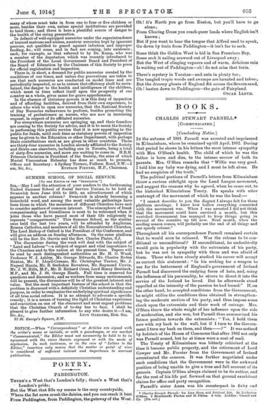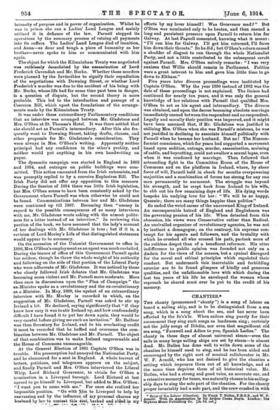BOOKS.
[Concluding Notice.]
Ire the autumn of 1881 Parnell was arrested and imprisoned in Kilmainham, where Ile remained up till April, 1882. During that period he shows in his letters the most intense sympathy with Mrs. O'Shea's health. The child of which he was the father is born and dies, to the intense sorrow of both its parents. Mra. O'Shea remarks that " Willie was very good. I told him my baby was dying, and I must be left alone. He had no suspicion of the truth."
The political portions of Parnell's letters from Kilmainhani throw a curious sidelight upon the Land League movement, and suggest the reasons why he agreed, when he came out, to the historical Kilmainham Treaty. He speaks with utter• contempt of the movement of which be was the head:— ' "I cannot describe to you the disgust I always felt for these platform meetings. I know how hollow everything connected with the movement was. When I was arrested I did not think that the movement could have survived a month, but this wretched Government has managed to keep things going in several of the counties up till now. Next month, when the seeding season comes, will probably see the end of all Wage and our speedy release."
Throughout all his correspondence Parnell remained certain that he would soon be released. Was the release to he con- ditional or unconditional P If unconditional, he undoubtedly would gain in popularity with the extremists of his party, but he was not in sympathy with them and was afraid of them. Those who have closely studied his career will accept as correct this statement : "In his seeking for• a weapon to use for the betterment of England's government of Ireland Parnell had discovered the undying force of hate, and, using the influence of his personality, he strove to direct it into the service of the Ireland he loved. But he afterwards stood appalled at the intensity of the passion he had loosed." If, on the other hand, lie accepted conditions from the Government, he might utilize the conditions thus obtained in strengthen- ing the moderate section of his party, and thus impose some check upon the extremists and their work of outrage. Mrs. O'Shea threw the whole weight of her influence upon the side of moderation, and she won, but Parnell thus summarized his future position towards the extremists : " Yes, I hold them now with my back to the wall, but if I turn to the Govern- ment I turn my back on them, and then—?" It was noticed by habitues of the House of Commons that after 1882 not only
was Parnell armed, but he at times wore a coat of mail. •
The Treaty of Kilmainbam was bitterly criticized at the time it became public property, and the retirement of Lord Cowper and Mr. Forster from the Government of Ireland accentuated the censure. It was further negotiated under such conditions that the Government were in the awkward position of being unable to give a true and full account of its genesis. Captain O'Shea always claimed to be its author, and for the rest of his life put forward on that ground exorbitant claims for office and party recognition.
Parnell's sister Anna was. his counterpart in fixity rind • Charles Stewart Parnell: his Lose Story aid Political We. Dy Nuthnrioe O'Shea. 2 Rembrandt Photos sad 16 Pintas. 2•rola. London Commit and Co. (2Ia nat.)
intensity of purpose and in power of organization. Whilst he was in prison she ran a Ladies' Land League and mainly utilized it in defiance of the law. Parnell stopped its operations by the summary process of vetoing all payments into its coffers. The Ladies' Land League died of inanition, and Anna—as dour and tough a piece of humanity as her brother--never spoke to him or communicated with him again.
The object for which the Kilmainham Treaty was negotiated was ruthlessly demolished by the assassination of Lord Frederick Cavendish and Mr. Burke. Whether these murders were planned. by the Invincibles to signify their repudiation of the negotiations with Downing Street, or whether Lord Frederick's murder was due to the accident of his being with Mr. Burke, whose life had for some time past been in danger, is a question of dispute, but the amend theory is more probable. This led to the introduction and passage of a Coercion Bill, which upset the foundations of the arrange- ments made by the Kilmainham Treaty.
It was under these extraordinary Parliamentary conditions that an interview was arranged between Mr. Gladstone and Mre. O'Shea at St. Thomas's Hotel. It was there settled that abe should act as Parnell's intermediary. After this she fre- quently went to Downing Street, taking drafts, clauses, and other proposals for Mr. Gladstone's consideration. They were always in Mrs. O'Shea's writing. Apparently neither principal had any confidence in the other's probity, and neither would put anything in his own handwriting on paper.
The dynamite campaign was started in England in 1883 and 1884, and outrages on public buildings were com- mitted. This action emanated from the Irish extremists, and was promptly replied to by a coercive Explosives Bill. The Irish Party did not offer any opposition to this measure During the Session of 1884 there was little Irish legislation, but Mrs. O'Shea seems to have been constantly asked by the Government where Parnell was when otherwise he could not be found. Communications between her and Mr. Gladstone were continued up till 1887. Becoming then "uneasy in regard to the possible consequences of so many interviews with me, Mr. Gladstone wrote asking with the utmost polite- ness for a letter instead of an interview." In reviewing this portion of the book, we have assumed that the lady's account of her dealings with Mr. Gladstone is true ; but if it is, a revision of Lord Morley's Life of that distinguished statesman would appear to be necessary.
On the accession of the Unionist Government to office in 1886,Mrs. O'Shea's employment as an agent was much curtailed. During the tenure of office of this Government Parnell spoke but seldom, though he threw the whole weight of his authority and following on the aide of that portion of the Liberal Party who were adherents of Mr. Gladstone. It was noticed by those who closely followed Irish debates that Mr. Gladstone was becoming more violent and Mr. Parnell more moderate. More than once in discussions upon the "Plan of Campaign" the ex-Minister spoke as a revolutionary and the ex-revolutionary ae a Minister. In May, 1888, the upshot of an extraordinary interview with Mr. Morley is recorded in which, on the suggestion of Mr. Gladstone, Parnell was asked to stir up Ireland a bit. He declined, saying significantly that "if they knew how easy it was to stir Ireland up, and how confoundedly difficult I have found it to put her down again, they would be very careful before giving me such an invitation." Mr. Balfour was then Secretary for Ireland, and to his everlasting credit it must be recorded that be baffled and overcame the com- bination between Mr. Gladstone and Mr. Parnell. The object of that combination was to make Ireland ungovernable and the House of Commons unmanageable.
At the General Election of 1885 Captain O'Shea was in trouble. His presumption bad annoyed the Nationalist Party, and he clamoured for a seat in England. A. whole torrent of letters, petitions, and telegrams appears on the subject, and finally Parnell and Mrs. O'Shea interviewed the Liberal Whip, Lord Richard Grosvenor, to obtain for O'Shea a nomination in a Liverpool borough. Lord Richard at last agreed to go himself to. Liverpool, but added to Mrs. O'Shea: "I want you to come with me." For once she realized her impossible position. "Go with ktlm to Liverpool to help by canvassing and by the influence of my personal charms my husband by law to contest this ieat, backed and aided in my efforts by my lover himself ! Was Grosvenor mad?" But O'Shea was nominated only to be beaten, and then ensued a long and persistent pressure upon Parnell to return him for Galway. At last Pasnell consented, knowing what it meant: "I'll run him for Galway. I'll get him returned, I'll force him down their throats." So he did ; but O'Shea's return caused a shudder of disgust to run through the whole Nationalist Party, and not a little contributed to the subsequent revolt against Parnell. Mrs. O'Shea naively remarks : "I was very anxious that Willie should remain in Parliament. Politics were a great interest to him and gave him little time to gO down to Elthain."
Five years later divorce proceedings were instituted by Captain O'Shea. Why the year 1890 instead of 1882 was the date a these proceedings is not explained. The liaison had continued for nearly ten years, and it was only the general knowledge of her relations with Parnell that qualified Mrs. O'Shea to act as his agent and intermediary. The divorce was obtained, and upon the decree becoming absolute marriage immediately ensued between the respondent and co-respondent. Legally and morally their position was improved, and it might have been assumed that, if Mr. Gladstone was justified in utilizing Mrs. O'Shea when she was Parnell's mistress, he was not justified in declining to associate himself politically with Parnell when he became her husband. But no ! The Noncon- formist conscience, which for years had supported a movement based upon sedition, outrage, murder, assassination, maiming of cattle, and boycotting, could not swallow a sexual lapse, even when it was condoned by marriage. Then followed that astounding fight in the Committee Room of the House of Commons and on the platform in Ireland, where, by sheer force of will, Parnell held in cheek for months overpowering majorities and a combination of forces too strong for any one man permanently to surmount. The struggle was beyond his strength, and he crept back from Ireland to his wife, to ebb out his few remaining days of life. His dying words bespoke his undying love for her: " We will be so happy, Queenie ; there are many things happier than politics."
So ended the weird career of the uncrowned King of Ireland. An unconquerable hatred of England and Englishmen was the governing passion of his life. When detached from this obsession, his views were Conservative rather than Radical. An unrivalled organizer of revolutionary agencies, he was not by instinct a demagogue; on the contrary, his supreme con- tempt for his agents and followers, and the brutality with which he crushed all who crossed his path, partook more of the ruthless despot than of a beneficent reformer. His utter indifference to public opinion was founded not only on a disdain for the views of the masses, but a cynical disregard for the moral and ethical principles which regulated their conduct. But underneath this inscrutable and forbidding exterior are to be found glimpses of kindly and generous qualities, and the unfathomable love With which during the lust ten years of his life be enveloped the woman whose reproach he shared must ever be put to the credit of his memory.











































 Previous page
Previous page